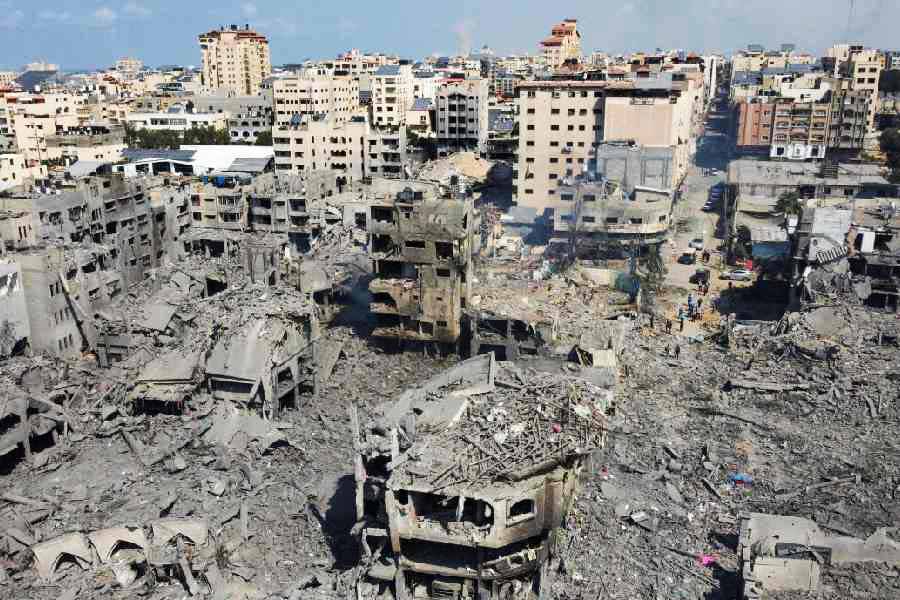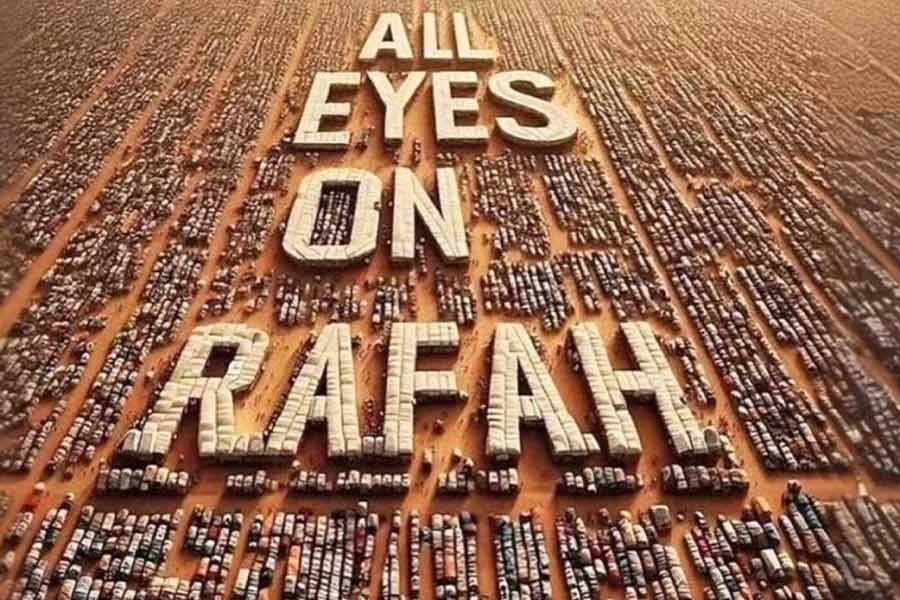I lost a friend after October 7. Someone I’d known for years had justified what I believe is the genocide of Palestinians at the hands of Israel by blaming Hamas. Yesterday, this friend posted an AI-generated image on their Instagram story that spelt out “All Eyes on Rafah”, which had garnered over 34 million shares on Instagram within a single day, including by Bollywood celebrities such as Priyanka Chopra, Alia Bhatt and Varun Dhawan.
The image — whose origin and creator are still unknown — is a sepia-toned artwork depicting tents in a camp in Rafah, a Palestinian city in the southern Gaza Strip. The tents, and the words it spells out, are accompanied by what looks like cloth-wrapped corpses — a sanitised representation of the content on Instagram posts coming from Palestine. Since most of these photos and videos are flagged by the Instagram community for containing sensitive content, they’re usually accompanied by a warning. You view the posts at your will. In real life, Palestinians don’t get a trigger warning.
There are hundreds, if not thousands, of Palestinian journalists covering the present conflict, not to mention the many Palestinian content creators posting material from safe zones in an attempt to find some respite in the middle of constant chaos. This includes 10-year-old Renad, who makes cooking videos. There’s no green screen behind her. You find her talking to the camera outside her tent. Israeli drones buzz as she smiles and teaches us how to cook. A user asks: “What is the soundtrack? By accident or design?” Instead of engaging with the news and content put out by Palestinians, it seems like most of us would prefer sharing an image generated by AI. All eyes are on Rafah, until they move on to cat videos, cafe reviews, thirst traps and whatever else Instagram has to offer.
But why this image in particular? One obvious answer is that the image helps leverage newfound activism, which is mostly performative, like hopping onto an Instagram trend because all your friends are doing it. If it has become trendy to protest the brutality of the Israeli occupation of the West Bank and everyone who supports the forces behind it, that’s potentially a good thing. To pretend like this ‘war’ isn't about public opinion is to pretend that the question “Do you condemn Hamas?” hasn’t been brandished in the face of every Palestinian with something to say.
The AI-generated image is a convenience for those who don’t want Instagram to change
It seems as though people like my friend would favour an AI-generated portrayal of harrowing reality instead of looking at the real wreckage. He knows that the image he’s sharing is AI-generated. One careful look reveals why. There is very little natural shadowing in it, especially considering the scale and density of the tents and corpses. (AI-generated images sometimes struggle to render realistic shadows.) The lines of tents creating the letters are perfectly straight and aligned, which is challenging to manufacture in reality. A heavily bombed ground is hardly pristine.

Instagram is for fun. It’s a platform where we cultivate a highly curated, visually appealing version of ourselves. The ideal personal brand. A lifestyle another should envy. What’s happening in Palestine is not enviable
The image is not real. It’s a depiction with stark capital letters that captures the ‘mood’ in Palestine — sombre, morbid, and desperately in need of attention.
Instagram is for fun. It’s a platform where we cultivate a highly curated, visually appealing version of ourselves. The ideal personal brand. A lifestyle another should envy. What’s happening in Palestine is not enviable. The AI-generated image is a convenience for those who don’t want Instagram to change. It’s a perfectly symmetrical image that will vanish in 24 hours and also keep people off your backs for not speaking for the Palestinians. It represents our attempt to preserve the remnants of what we know of Instagram, even if it comes at the cost of many Palestinian journalists and content creators, who painstakingly capture the reality of their state whenever they can. (Since Israeli airstrikes have damaged key communications infrastructure, Palestnians need donated foreign eSIMs to communicate to the rest of the world. Even then it’s difficult because downloading new eSIMs requires an existing internet connection.)
The assumption is that once you know the ‘mood’ of something, you know enough about it

There is nothing Instagrammable about real images of destruction from Rafah TT Archives
If Instagram had to make a picture viral, it had to be a picture that ignores nuance. It had to be a sight we could digest, which allows us to tune in and out of reality and return to our normal, unaffected lives. An image that doesn’t accuse us of complicity. An image we see and share at our will. The assumption is that once you know the ‘mood’ of something, you know enough about it. To understand the reality of the genocide, you have to actively engage, not mindlessly scroll. Many of the posts by Palestinian journalists and creators are removed or restricted, and most of the creators are constantly shadowbanned, making their posts invisible or less visible to other users. To become viral, you have to be easily accessible as well, which is a luxury that these journalists and creators cannot afford.
Although Instagram is a platform that lets users link and reference other posts by embedding them into their own content, there are no actionable resources accompanying the stories with the AI-generated image. Not unless you add them yourself. Most of the people who shared the image, including celebrities, did so without adding any links to resources or donations. You’ve managed to capture someone’s fleeting attention, but where do they go to convert that attention into something tangible?
The counterargument, of course, is that sharing even a soulless AI-generated image is better than not saying anything at all. Support, superficial or not, is still support. Even if the image fails to capture the sheer brutality of this so-called war, it at least communicates the larger essence. Gatekeeping support only leads to fewer supporters. Palestine, and the rest of the world, needs more people to be outraged. Too bad it takes an AI-generated image. Real people rarely seem to make the cut.
Diya Isha is an editor at a Delhi-based publishing consultancy. You can find her on Instagram @contendish
